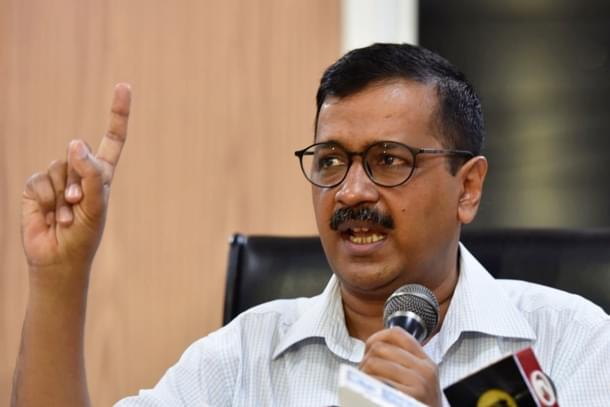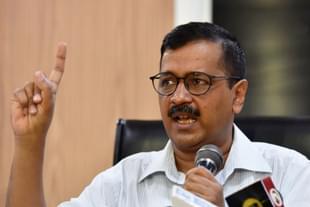News Brief
Kejriwal Moves Delhi High Court Against Enforcement Directorate—Here's What Has Happened So Far In Liquor Policy Case
Arjun Brij
Nov 12, 2024, 01:57 PM | Updated 01:57 PM IST
Save & read from anywhere!
Bookmark stories for easy access on any device or the Swarajya app.


Former Delhi Chief Minister Arvind Kejriwal has filed a petition in the Delhi High Court challenging the maintainability of criminal complaints lodged by the Enforcement Directorate (ED) against him.
These complaints were filed under Section 174 of the Indian Penal Code (IPC) after Aam Aadmi Party (AAP) national convener Kejriwal allegedly failed to comply with ED summons related to the Delhi excise policy case.
Justice Manoj Kumar Ohri of the Delhi High Court has asked the ED to respond to Kejriwal’s petition, scheduling the next hearing for 19 December. Kejriwal's request to stay the trial proceedings was denied, with Justice Ohri instructing ED’s counsel to provide their reply in the coming weeks.
Kejriwal’s petition challenges the trial court’s decision to take cognizance of the ED’s complaint, contending that the complaint is invalid under procedural grounds.
The crux of the argument, presented by Senior Advocate Rebecca John, is that while the summons was issued by one ED officer, the subsequent complaint was filed by another officer of the same rank, which is in contravention of procedural laws.
According to Section 195 of the Criminal Procedure Code (CrPC), any complaint filed by a public servant must be made either by the officer who issued the summons or by a superior officer.
John highlighted that the complaint was filed by ED’s Assistant Director Sandeep Sharma, whereas the summons were issued by Assistant Director Joginder, who was neither unavailable nor had left his position. This discrepancy forms the basis of Kejriwal’s challenge, arguing that such a procedural lapse undermines the legality of the complaint.
ED’s counsel Zoheb Hossain raised objections to the petition’s maintainability, asserting that it amounts to a second revision petition disguised as a plea under Section 482 of the CrPC. He argued that the grounds presented in this High Court petition mirror those already addressed in earlier proceedings at the trial court level.
Background of the Liquor Policy Case
The ED’s complaints against Kejriwal stem from an investigation into alleged irregularities in Delhi’s now-scrapped 2021-22 excise policy. The probe, conducted by both the ED and the Central Bureau of Investigation (CBI), centers on allegations that AAP leaders, including Kejriwal, facilitated loopholes in the excise policy to benefit liquor lobbyists in exchange for kickbacks. It is alleged that the funds received from these transactions were subsequently funneled into AAP’s election campaigns, including those in Goa.
Kejriwal was arrested by the ED in March of this year and later granted interim bail by the Supreme Court. He returned to custody in June, but the Supreme Court again granted him interim bail in July, followed by bail in the CBI case in September. He was released shortly thereafter.
The former Chief Minister of Delhi stepped down from office following his release. The AAP, now led by other senior leaders, is gearing up for the upcoming assembly elections in the national capital.
Trial Court Proceedings
The complaints under Section 174 of the IPC were filed after Kejriwal failed to respond to ED’s summons, which were issued under Section 50 of the Prevention of Money Laundering Act (PMLA).
The summons compel attendance, production of documents, and other actions necessary for the ED’s investigative process. In February and March, Additional Chief Metropolitan Magistrate (ACMM) Divya Malhotra at Delhi’s Rouse Avenue Court summoned Kejriwal based on these complaints.
Kejriwal’s legal team previously sought relief from the Sessions Court, challenging the trial court’s decision to take cognizance of the ED’s complaints. However, the Sessions Court dismissed the plea on 17 September, affirming the validity of the summons and the complaints filed under Section 174 of the IPC.
Following this, Kejriwal’s legal team has moved the Delhi High Court, questioning both the trial court’s cognizance of the complaints and the procedure followed by the ED in filing the complaints.
Legal Arguments on Procedural Grounds
In the Delhi High Court hearing, Kejriwal’s lawyer Rebecca John argued that since Assistant Director Joginder had issued the summons, he alone should have filed the complaint, unless unavailable or having left office. She argued that allowing another officer of the same rank to file the complaint undermines due process.
The petition thus questions the ED’s internal handling of procedural requirements, which Kejriwal’s team argues is crucial to determining the complaint's maintainability.
Meanwhile, ED’s special counsel Zoheb Hossain defended the agency’s complaint, dismissing the argument of procedural lapses. He contended that Kejriwal’s plea in the High Court represents a duplicative attempt to overturn lower court decisions, which is generally impermissible under procedural law.
Next Step
The Delhi High Court has issued a notice to the ED, requiring it to formally respond to Kejriwal’s petition. The next hearing in the case is scheduled for 19 December, at which point the High Court will examine the ED’s reply and deliberate on the procedural challenges raised by Kejriwal’s defense.
Arjun Brij is an Editorial Associate at Swarajya. He tweets at @arjun_brij





